 Petzlover
Petzlover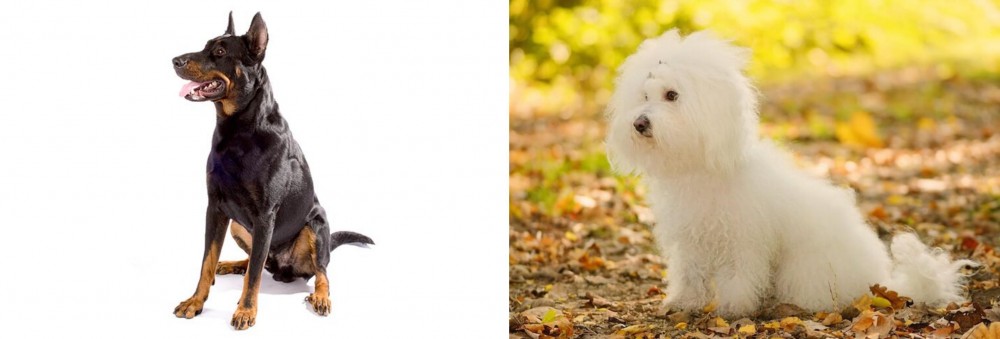 Beauceron is originated from France but Bichon Bolognese is originated from Spain. Beauceron may grow 67 cm / 27 inches higher than Bichon Bolognese. Beauceron may weigh 20 kg / 45 pounds more than Bichon Bolognese. Both Beauceron and Bichon Bolognese has almost same life span. Both Beauceron and Bichon Bolognese has almost same litter size. Both Beauceron and Bichon Bolognese requires Low Maintenance.
Beauceron is originated from France but Bichon Bolognese is originated from Spain. Beauceron may grow 67 cm / 27 inches higher than Bichon Bolognese. Beauceron may weigh 20 kg / 45 pounds more than Bichon Bolognese. Both Beauceron and Bichon Bolognese has almost same life span. Both Beauceron and Bichon Bolognese has almost same litter size. Both Beauceron and Bichon Bolognese requires Low Maintenance.
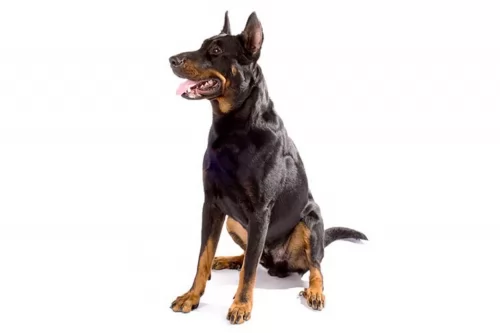 Sometimes referred to as the king of sheepdogs, the Beauceron is a French dog breed that happens to be an extraordinary herding dog too. He instinctively rounds up livestock without even being trained to do so. The dog is also known as Berger de Beauce, originating from the Beauce region in France and is closely related to the Briard or Berger de Brie.
Sometimes referred to as the king of sheepdogs, the Beauceron is a French dog breed that happens to be an extraordinary herding dog too. He instinctively rounds up livestock without even being trained to do so. The dog is also known as Berger de Beauce, originating from the Beauce region in France and is closely related to the Briard or Berger de Brie.
This French breed’s origin goes back to the late 16th century, and the Beauceron was divided into two working types way back in 1863 - the dog with the long coat was known as Berger de Brie or Briard while the short-coated dog became known as Beauceron. It was in 1922 that a club for this dog breed was established, and the Beauceron Club of America was established in 1980, only recently receiving recognition by the American Kennel Club.
 The Bichon Bolognese is one of 4 types of Bichon breeds the others being the Havense, the Bichon Frise and the Maltese. The Lowchen and the Coton de Tulear are also listed in this grouping at times. The Bolognese was developed in Italy and is a small, companion animal. They are named after the city of Bologna in Northern Italy. The Bichon Bolognese is considered a toy dog and are considered an ancient breed that lived with Italian nobility. Their precise ancestry is not known and the Maltese is considered its closest relative. They have been known to exist since at least 1200.
The Bichon Bolognese is one of 4 types of Bichon breeds the others being the Havense, the Bichon Frise and the Maltese. The Lowchen and the Coton de Tulear are also listed in this grouping at times. The Bolognese was developed in Italy and is a small, companion animal. They are named after the city of Bologna in Northern Italy. The Bichon Bolognese is considered a toy dog and are considered an ancient breed that lived with Italian nobility. Their precise ancestry is not known and the Maltese is considered its closest relative. They have been known to exist since at least 1200.
The Bichon Bolognese is found in many works of art throughout the centuries. They were the favorite of many an Italian artist since the 17th century including Titian, Watteau, Gosse and Goya. They were known to be owned by Duke Frederico Gonzaga, Madame De Pompadour, Catherine the Great of Russia and Empress Maria Theresa of Austria. Cosimo de Medici gave eight Bolognese to Belgian noblemen. The Duke d’Este was given two as a gift.
Of all the Bichon group – the Bolognese is the hardest to find and the best problem solver. They read body language amazingly well, stick with their owners and are attentive and devoted. Liz Stannard brought them to England in 1990 and they were entered in the breed registry that same year and joined the show ring cycle in 2001. By 2002 they were shown at Crufts, England’s International Dog Show.
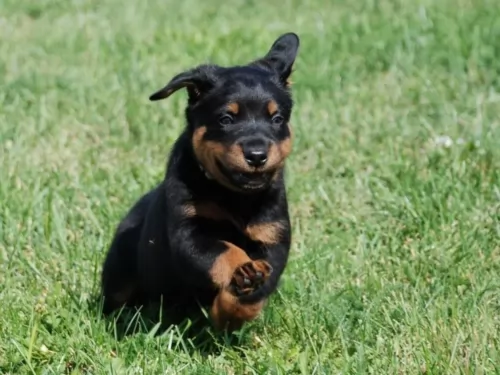 The Beauceron is an intelligent dog, just by looking at the alert, bright face. He is a muscular, large dog breed, standing up to 71cm in height and weighing in at up to 50kg. You’ll recognize him with his dark black coat with red markings, particularly around the feet, which interestingly gives this breed the French nickname Bas Rouge. It means red stockings. Harlequin, tri-coloured grey, black and tan is also recognized as a color.
The Beauceron is an intelligent dog, just by looking at the alert, bright face. He is a muscular, large dog breed, standing up to 71cm in height and weighing in at up to 50kg. You’ll recognize him with his dark black coat with red markings, particularly around the feet, which interestingly gives this breed the French nickname Bas Rouge. It means red stockings. Harlequin, tri-coloured grey, black and tan is also recognized as a color.
The coat is rough, short and dense, the alert eyes dark brown and the ears are set high and can be cropped or natural. The natural ears are half pricked or drop ears and are fairly short. Looking similar to the Doberman and Rottweiler but with a long tail, this French Shepherd dog is somewhat slimmer but with a foreboding appearance. He is solid, well proportioned and well muscled and gives the impression of strength. He has a tolerant nature and will fit in well with a family when trained and socialized.
 Like the other members of the Bichon group, the Bolognese is a compact, little white dog. It is considered a member of the toy group and is stocky in its build. It is a muscled, square dog of medium length with an ovoid skull and large, square, black muzzle. The jaw is well developed, and they have black lips, black nose and black eyelids. They have a straight muzzle with a strong, aligned bite and its eyes are round and wide. They have long, high set ears that hang down to a rigid base. The coat is white, long and shorter only at the muzzle. The coat is fluffy but not fringed.
Like the other members of the Bichon group, the Bolognese is a compact, little white dog. It is considered a member of the toy group and is stocky in its build. It is a muscled, square dog of medium length with an ovoid skull and large, square, black muzzle. The jaw is well developed, and they have black lips, black nose and black eyelids. They have a straight muzzle with a strong, aligned bite and its eyes are round and wide. They have long, high set ears that hang down to a rigid base. The coat is white, long and shorter only at the muzzle. The coat is fluffy but not fringed.
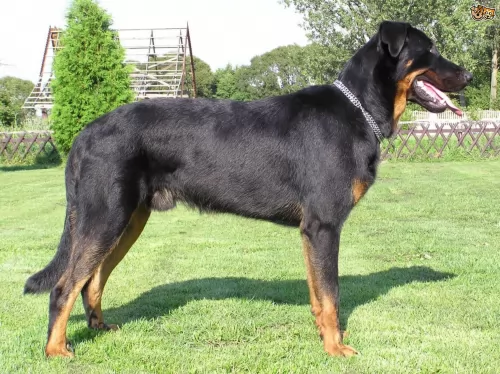 Strong, big, confident and good-looking the Beauceron makes an excellent watchdog, guarding the human family that he is so devoted too. He is a good friend and companion and is tolerant with children and other pets.
Strong, big, confident and good-looking the Beauceron makes an excellent watchdog, guarding the human family that he is so devoted too. He is a good friend and companion and is tolerant with children and other pets.
He is such a clever breed too, and its small wonder that he has always been sought after for hard work – herding, shepherding and even rescue work. When he’s not involved in working, at home, he’s just your big, devoted friend.
 These little white dogs with the shaggy hair are intelligent, loving, playful, loyal, and happy to do whatever you ask them to. They are more reserved than their relative the Bichon Frise. They are great at obedience training and seem to love it. They learn quickly and love to please you, yet they can also be very stubborn. Like the Bichon Frise, they are difficult to housebreak. They need to be with their people who they will develop bad habits and a bad attitude. They are bred to be companion dogs. If socialized when young they are great with strangers after you have indicated that the strangers are ok. They are barking watchdogs but not continuous barkers. They get along with other dogs but are ok by themselves as well. They do get separation anxiety when their people are gone for extended periods of time. They can be very serious and docile, but they love to be with people. They are very loyal and very bonded to their family.
These little white dogs with the shaggy hair are intelligent, loving, playful, loyal, and happy to do whatever you ask them to. They are more reserved than their relative the Bichon Frise. They are great at obedience training and seem to love it. They learn quickly and love to please you, yet they can also be very stubborn. Like the Bichon Frise, they are difficult to housebreak. They need to be with their people who they will develop bad habits and a bad attitude. They are bred to be companion dogs. If socialized when young they are great with strangers after you have indicated that the strangers are ok. They are barking watchdogs but not continuous barkers. They get along with other dogs but are ok by themselves as well. They do get separation anxiety when their people are gone for extended periods of time. They can be very serious and docile, but they love to be with people. They are very loyal and very bonded to their family.
Be sure you are the pack leader as they can acquire Small Dog Syndrome. With this syndrome the dog comes to believe he is the alpha and the humans are his pack. This causes many kinds of problems with behavior including howling when not getting attention, their separation anxiety and destructiveness can also come from this.
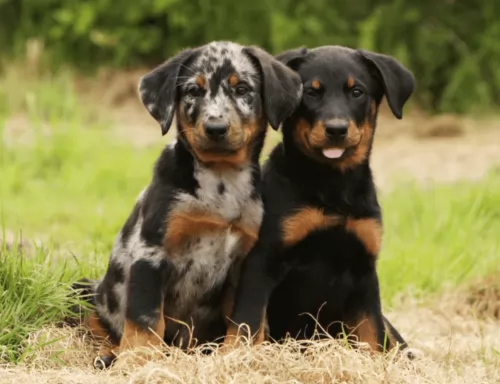 It’s such a nice strong, good-looking dog this, you can’t think of anything going wrong with him. His lifespan is anything from 10 to 14 years and the dog is pretty robust. Being a large breed and a pedigree, he is prone to some common ailments. When you suspect your beloved pet has any health issue, don’t hesitate to get him to the vet.
It’s such a nice strong, good-looking dog this, you can’t think of anything going wrong with him. His lifespan is anything from 10 to 14 years and the dog is pretty robust. Being a large breed and a pedigree, he is prone to some common ailments. When you suspect your beloved pet has any health issue, don’t hesitate to get him to the vet.
A painful disorder that affects larger dogs and brought about by an abnormal development in the joints.
Also a painful condition where the stomach twists so that the blood supply is cut off. Large breeds with deep chests are more prone to developing the condition. Rapid breathing and signs of pain can be indicative of this ailment.
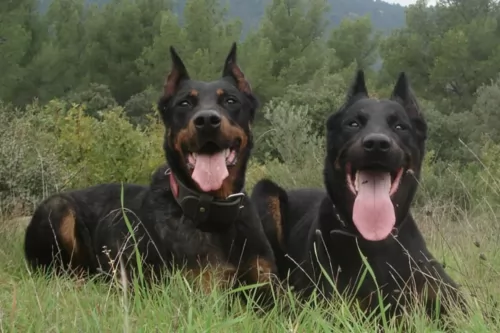 This is a large, hard-working, energetic dog and he will need high-quality food, whether commercially manufactured or home-prepared. The best commercially manufactured dog foods produce foods with the right balance of minerals and vitamins in keeping with your dog’s age, his activities and his stage of life (illness, senior, puppy). If you’re unsure about what to feed your Beauceron, speak to your vet to be 100% that you are meeting his nutritional demands, and always ensure a bowl of cool, clean water is constantly available.
This is a large, hard-working, energetic dog and he will need high-quality food, whether commercially manufactured or home-prepared. The best commercially manufactured dog foods produce foods with the right balance of minerals and vitamins in keeping with your dog’s age, his activities and his stage of life (illness, senior, puppy). If you’re unsure about what to feed your Beauceron, speak to your vet to be 100% that you are meeting his nutritional demands, and always ensure a bowl of cool, clean water is constantly available.
You’re lucky with the Beauceron as he is a low shedding, low maintenance dog with his short coat. He doesn’t require any trimming but will need a good brush twice a week to rid him of loose hairs. Clean his teeth with a special dog toothbrush and toothpaste to avoid plaque buildup. Never use human toothpaste. Clip his nails if he doesn’t wear them down naturally.
This is a big, strong, energetic dog, and you owe it to him to ensure he gets lots of exercise – runs, walks and ball games. If you can’t be a responsible dog owner, don’t own a breed like this as he can become destructive if not kept active.
 Like other toy breeds do not overfeed the Bolognese. Feed them ¼ of a cup of high quality dry food once a day. Treats are often used for training just be judicious with them.
Like other toy breeds do not overfeed the Bolognese. Feed them ¼ of a cup of high quality dry food once a day. Treats are often used for training just be judicious with them.
They are very healthy with a propensity toward: Moving kneecaps (Luxating patella)
Legg-Calve-Perthes Disease – This causes the thigh bones to shrink due to a loss of blood supply. It can be repaired surgically.
Periodontal Disease due to their small mouth size.
They need to walk everyday but they can be couch potatoes. One long 20-minute walk will do or a couple 10-minute walks.
While Bolognese are perfectly happy to lounge around the house, they should also have a daily walk.[7] A suitable walk would be around 20–25 minute a couple of times a day or substitute 10-minute walks a few times a day. They love to play off-lead, whether its in the house or in a fenced in yard or dog park.